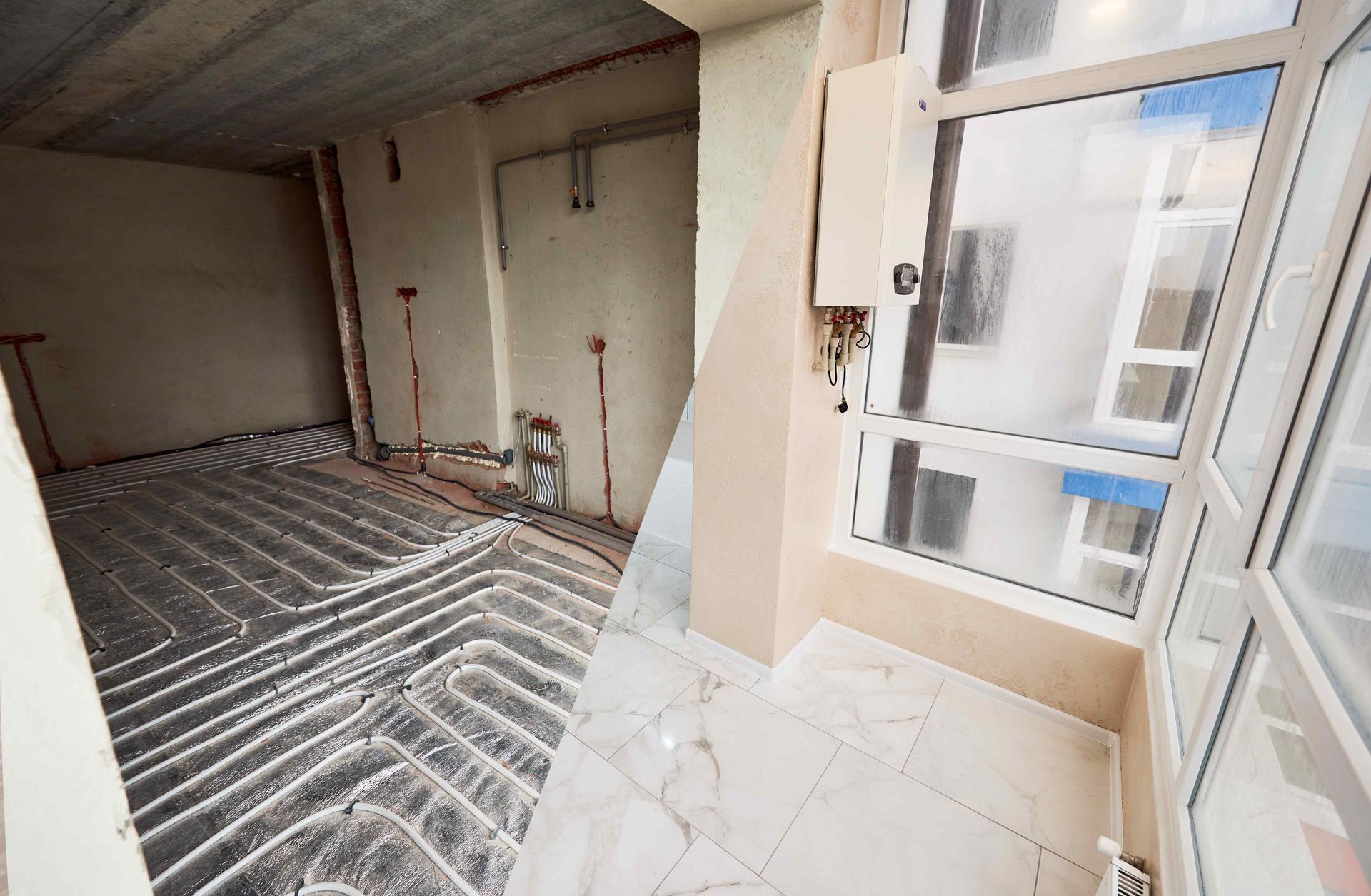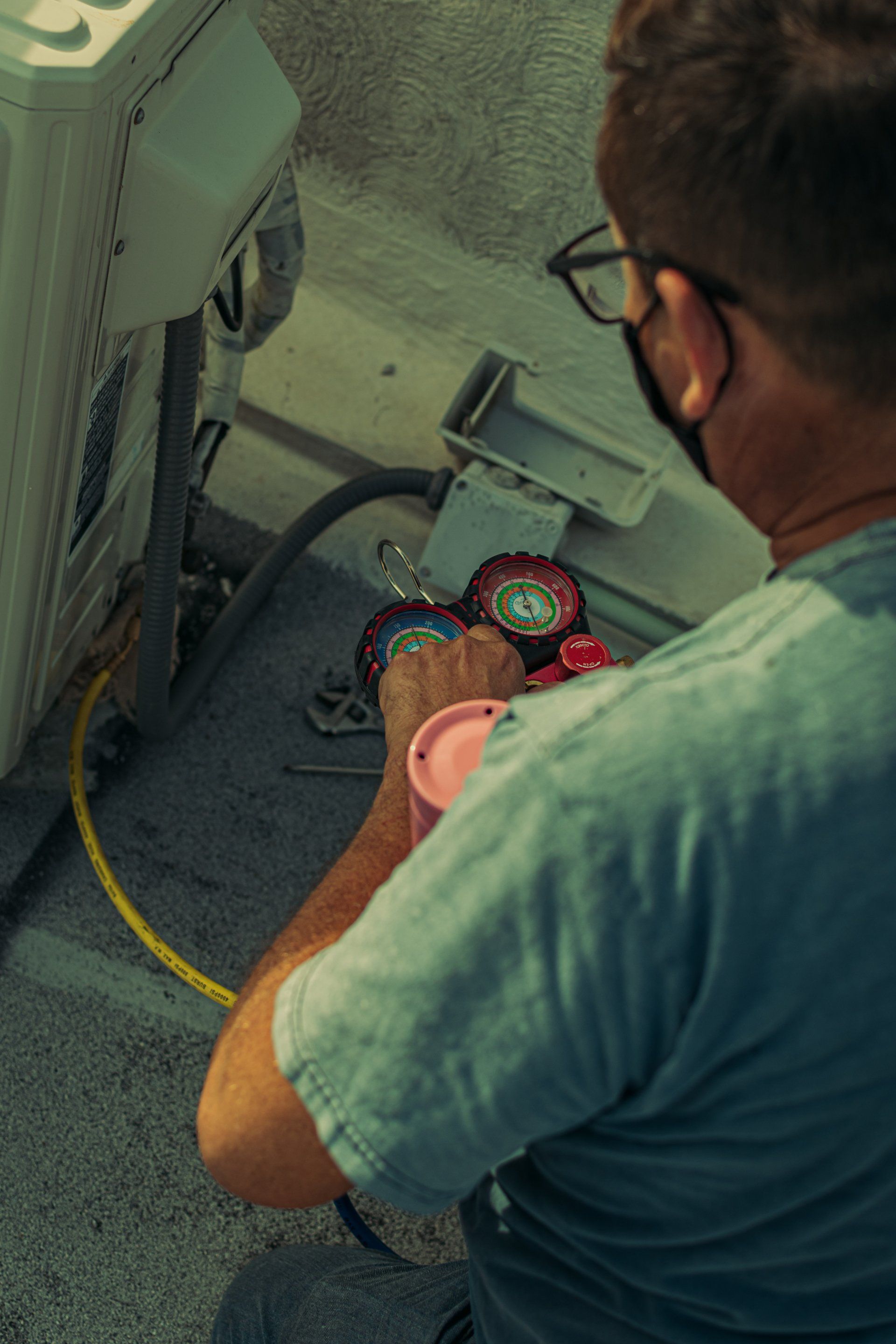In-Floor Heating Services Winnipeg MB
Welcome To Our exceptional Floor Heating Services!
Our In-floor heating is a great way to make your home warmer and more comfortable during the cold winter months. Especially here in Winnipeg, Manitoba or its surrounding regions, where temperatures can drop quite drastically during winter.
The Wonders Of Indoor Floor Heating
Heated Floors have a host of good qualities. The silent and hidden operations of this system are really convenient. There are no exposed hot surfaces, or sharp edges. It has much better energy efficiency and heat distribution because the heat transfers directly to the room's surfaces and objects. There's less heat loss as a result when compared to systems that use ducts or vents. When It comes to in-floor heating, it is becoming less of a luxury and more of a staple of comfort in peoples homes.
Get Instant Quote
HVAC Repair Lead Form
We will get back to you as soon as possible.
Please try again later.

How it works!
floor heating works by circulating warm water through tubes under the floor, creating a warm, even heat across the entire floor. This means you don't have to worry about cold spots or hot spots in your home. Plus, because the heat is coming from the floor, you don't have to worry about air circulation or air drafts.

Overview Of Our In-Floor Heating Services & Options
In-floor heating, also known as radiant floor heating, offers an efficient and uniform way to heat homes. By delivering heat directly from the floor, it provides comfort and warmth more effectively than many traditional heating systems. There are primarily two types of in-floor heating systems: electric and hydronic. Each has its unique benefits and considerations, along with varying installation fees.
Electric In-Floor Heating
Pros:
- Ease of Installation: Electric radiant heating is generally easier and less costly to install than hydronic systems, making it a preferred choice for small areas or retrofit projects.
- Low Maintenance: Once installed, electric systems require very little maintenance.
- Quick Response Time: They heat up quickly, making them ideal for use in bathrooms and kitchens where immediate warmth is often desired.
Cons:
- Higher Operating Costs: While the installation might be less expensive, the cost to run electric radiant flooring can be higher than hydronic systems, especially in areas with high electricity rates.
- Not Ideal for Whole-House Heating: Due to these higher operational costs, electric in-floor heating is often used for smaller spaces rather than as the primary heat source for a home.
The cost can vary widely depending on the size of the area and the type of system installed. On average, homeowners might spend between $10 to $20 per square foot for electric in-floor heating systems.
Hydronic In-Floor Heating
Pros:
- Cost-Efficient for Large Areas: Hydronic systems, which use heated water pumped through polyethylene tubing in the floor, are more cost-effective for heating larger areas or entire homes.
- Lower Operating Costs: They are generally more economical over the long term, particularly in areas where gas is cheaper than electricity.
- Versatile Energy Sources: These systems can be heated with a wide variety of energy sources, including standard gas- or oil-fired boilers, wood-fired boilers, solar water heaters, or a combination of these.
Cons:
- Higher Initial Installation Cost: The installation of a hydronic radiant floor system can be more expensive and complex due to the need for a boiler, pumps, and the piping itself.
- Longer Warm-Up Time: Hydronic systems take longer to heat up than electric systems, which might not be ideal for everyone.
Installation costs for hydronic systems are generally higher, averaging between $12 to $25 per square foot. The overall cost can increase significantly based on the complexity of the system and the type of energy used to heat the water.
Choosing the Right In-Floor Heating System
The choice between electric and hydronic in-floor heating systems depends on several factors, including the size of the area you wish to heat, your budget for both installation and operation, and your heating needs. While electric radiant floors might be suitable for supplemental heating in smaller rooms, hydronic systems are better suited for whole-house heating solutions. Additionally, the type of flooring you have can influence your decision; certain flooring materials conduct and hold heat differently.
What to Expect - Installation Costs
On average, homeowners may spend $6,000 to $14,000 for the installation of an in-floor heating system, with larger projects and hydronic systems leaning towards the higher end of this range. It's important to consider both the short-term and long-term costs associated with each type of system. While electric systems have a lower upfront cost, the operational expenses can add up over time, especially in colder climates or for larger installations. Conversely, the initial investment in a hydronic system may be higher, but the operational costs will generally be lower, making it a more economical choice in the long run.
Most Cost Effective Water Heating System for Hydronic In-floor Heating
hydronic in-floor heating system, the most energy-efficient choices tend to be solar water heaters and heat pumps, including geothermal (or ground-source) and air-source heat pumps. Here’s why these options stand out in terms of energy efficiency:
Solar Water Heaters
Solar water heaters use solar panels to capture energy from the sun, which is then used to heat water. This process is incredibly efficient because it directly converts solar energy into thermal energy without needing to burn fossil fuels or use electricity generated from non-renewable resources. The primary energy source is free and abundant, making solar water heating systems among the most sustainable and efficient options for in-floor heating. The efficiency of solar thermal conversion is high, and while the initial installation costs can be significant, the operational costs are very low, leading to savings over time.
Heat Pumps
Heat pumps, both air-source and geothermal, are highly efficient for a few reasons:
- Geothermal Heat Pumps: These systems use the stable temperature of the earth (a few feet below the surface) as a source for heating and cooling. In the winter, they extract heat from the ground, and in the summer, they can reverse the process to cool a home. This method is incredibly efficient because it moves heat rather than generating it through combustion or resistance heating. Geothermal systems can achieve efficiencies of 300% to 600%, meaning they produce three to six times more energy in heat than they consume in electricity.
- Air-Source Heat Pumps: Similar to geothermal, air-source heat pumps transfer heat between your house and the outside air. Recent advances in technology have significantly improved their efficiency, even in colder climates. While not as efficient as geothermal systems in extreme conditions, modern air-source heat pumps can still operate efficiently, with some models working effectively in temperatures as low as -15°F (-26°C).
Electric In-Floor Heating - How To optimize It
Electric floor heating systems, known for their ease of installation and comfort, are typically used as a standalone heating solution for specific areas like bathrooms, kitchens, or basements. However, when considering whole-house heating solutions or enhancing the efficiency of an electric floor heating system, pairing it with other heating systems can optimize energy use and overall comfort. Here's a look at heating systems that complement electric floor heating well:
Heat Pumps
Air-Source Heat Pumps: These are an efficient match for electric floor heating. Air-source heat pumps can provide heating and cooling for the whole house at a fraction of the operating costs associated with traditional heating systems. When used in conjunction with electric floor heating, the heat pump can efficiently maintain the overall temperature of the house, while the floor system provides direct, radiant warmth in designated areas.
Geothermal Heat Pumps: Also known as ground-source heat pumps, these offer one of the most energy-efficient ways to heat and cool your home. Pairing geothermal heat pumps with electric floor heating ensures that the house remains comfortable through various means of heat distribution, utilizing the constant temperature of the earth as a source.
Solar Heating Systems
Solar heating systems can complement electric floor heating by reducing the reliance on grid electricity. Photovoltaic (PV) panels can generate electricity to power electric floor heating, making the combination more sustainable and potentially reducing electricity bills. Solar thermal systems, though less commonly used for this purpose, can also contribute by providing hot water that can be used in other parts of the home's heating system, indirectly supporting the energy needs of electric floor heating.
High-Efficiency Furnaces or Boilers
When paired with a high-efficiency furnace or boiler that heats the air or water for the rest of the home, electric floor heating can be used as a supplementary heat source. This combination allows the electric system to provide the comfort of warm floors where desired, while the furnace or boiler efficiently meets the broader heating demands of the house.
Hybrid Systems
Some homes employ a hybrid approach, using electric floor heating in conjunction with one or more of the above systems to create zones. Each zone can be heated according to its specific use and occupancy, maximizing comfort and minimizing energy consumption. Smart thermostats can further enhance this approach by allowing precise control over each zone's temperature.
Considerations
- Energy Source and Costs: The choice of a complementary heating system often depends on local energy costs and availability. For example, in areas where electricity is expensive, pairing electric floor heating with a heat pump or solar panels can mitigate costs.
- Climate: In very cold climates, pairing electric floor heating with a robust system like a geothermal heat pump ensures the home remains warm and efficient, even on the coldest days.
- Installation and Operational Costs: Consider both the installation and long-term operational costs when selecting a system to pair with electric floor heating. Energy-efficient systems like heat pumps and solar panels may have higher upfront costs but offer significant savings over time.
Combining electric floor heating with another heating system can provide an efficient, comfortable, and flexible solution tailored to the specific needs and layout of a home. Consulting with HVAC professionals can help homeowners choose the best combination of systems based on their unique circumstances.



Our Process
We begin by assessing the area and making sure there isn't any existing damage or issues before we begin our custom-designed floor plan suited to your living space. We believe in transparency and filling you in every step along the way. After we've finished, we then provide you with the information we've gathered, we will then provide our quote and begin installation. Depending on the type of floor system you decide to install, for a single room, the process could take anywhere from a day to 2 or 3. Electric floor systems are usually quicker because they involve laying out mats or cables on the subfloor. Hydronic floor systems can take longer due to the tubing, a boiler or water heater, and possibly pumps and manifolds that we would install.
FAQs
Got a question about floor heating? Browse below to find the answers.....
-
What is radiant floor heating?
Radiant floor heating is a system that heats your home from the floor up through a network of tubing or electric heating elements installed beneath the floor surface. It provides even, comfortable warmth across the entire room.
-
How does radiant floor heating work?
There are two main types: hydronic (using hot water running through pipes) and electric (using electrical coils). They heat the floor, which then radiates warmth throughout the room from the ground up.
-
Can radiant floor heating be installed under any type of flooring?
It is compatible with various types of flooring, including tile, concrete, vinyl, and some types of wood. However, the efficiency may vary depending on the flooring material's thermal conducting properties.
-
Is radiant floor heating energy-efficient?
Yes, it is more energy-efficient than traditional heating systems because it heats the space evenly at a lower temperature and minimizes heat loss.
-
How long does a radiant floor heating system last?
A well-installed and maintained system can last up to 35 years, which is longer than most conventional heating systems.
-
Can radiant floor heating be used as the primary heat source?
Absolutely. When properly installed and sized, radiant floor heating can serve as the primary heating source for a home.
-
How much does it cost to install radiant floor heating?
The cost varies depending on the type (hydronic or electric), the size of the area, and the complexity of the installation. Generally, electric systems are cheaper to install but more expensive to operate than hydronic systems.
-
How long does it take to install radiant floor heating?
Installation time can vary widely based on the system type and project size. Generally, it can take anywhere from a few days to a week for an average-sized home.
-
Does radiant floor heating require a lot of maintenance?
Radiant floor heating systems require minimal maintenance. Hydronic systems may need occasional checks for leaks and pressure issues, while electric systems are virtually maintenance-free.
-
Can I control the temperature in individual rooms with radiant floor heating?
Yes, you can control the temperature room-by-room using zoning valves or thermostats, making it a highly customizable heating option.
Why Choose Us
When you work with HVAC Repair Winnipeg in Winnipeg or its surrounding cities, we guarantee excellence and satisfaction. We know that these are crucial parts of your home and handle these matters with care. Eliminate the hassle and inconvenience of HVAC repairs. Contact us today for a free consultation!
Quick & Reliable
We are available 24/7 for all your HVAC Repair needs!
Navigation
Working hours
- Sunday
- -
- Mon - Fri
- -
- Saturday
- -
All Rights Reserved | Hvac Repair Winnipeg
